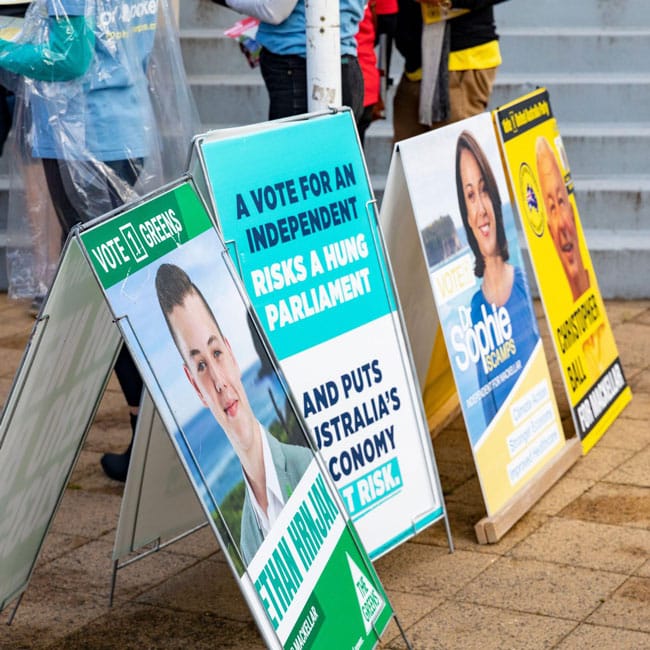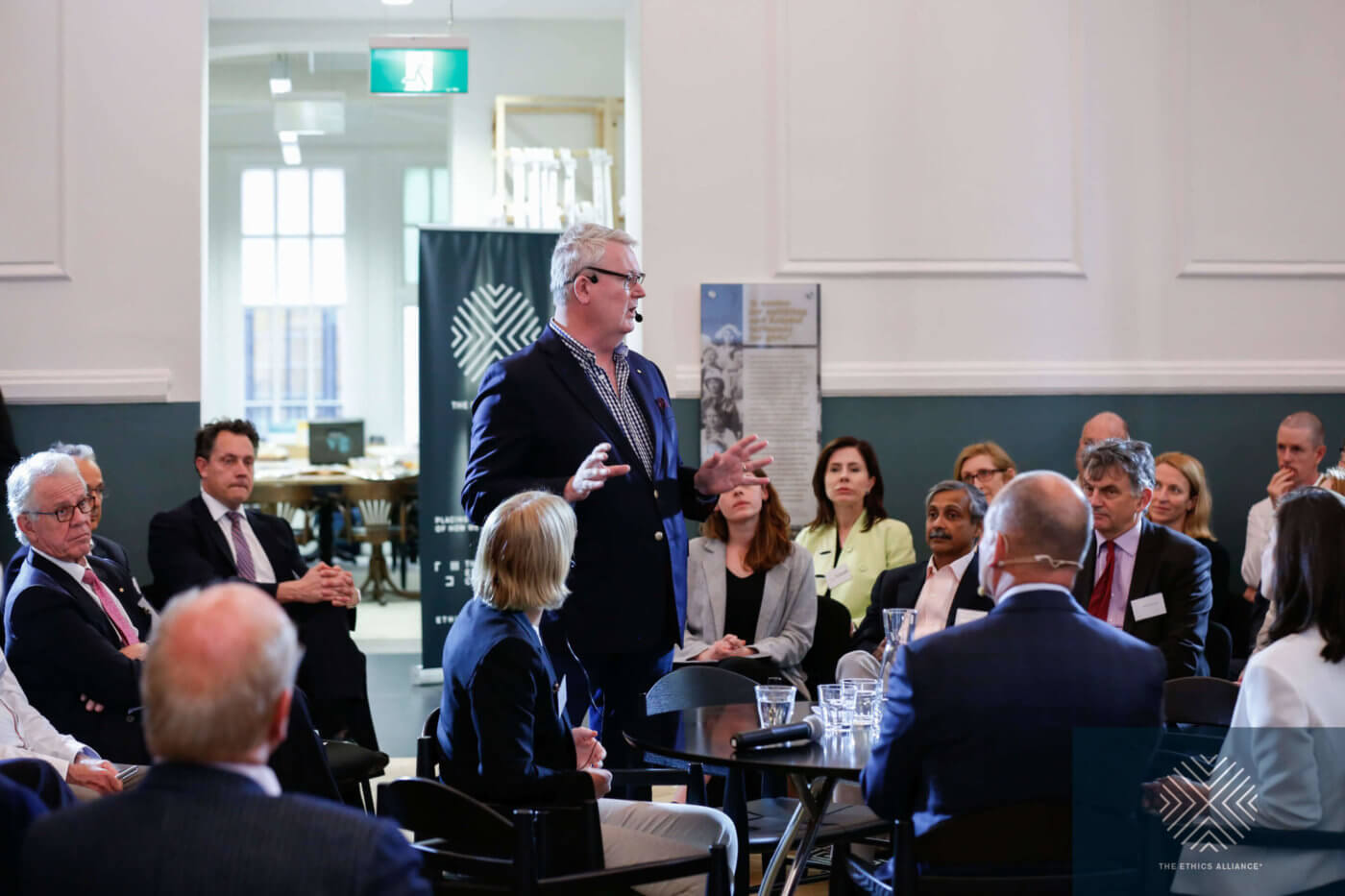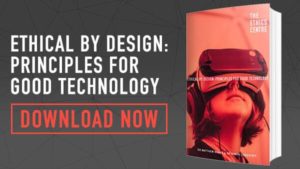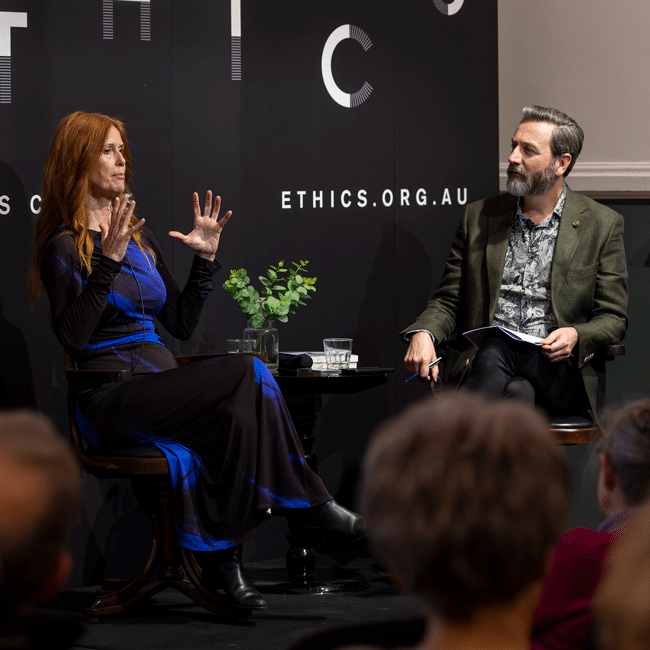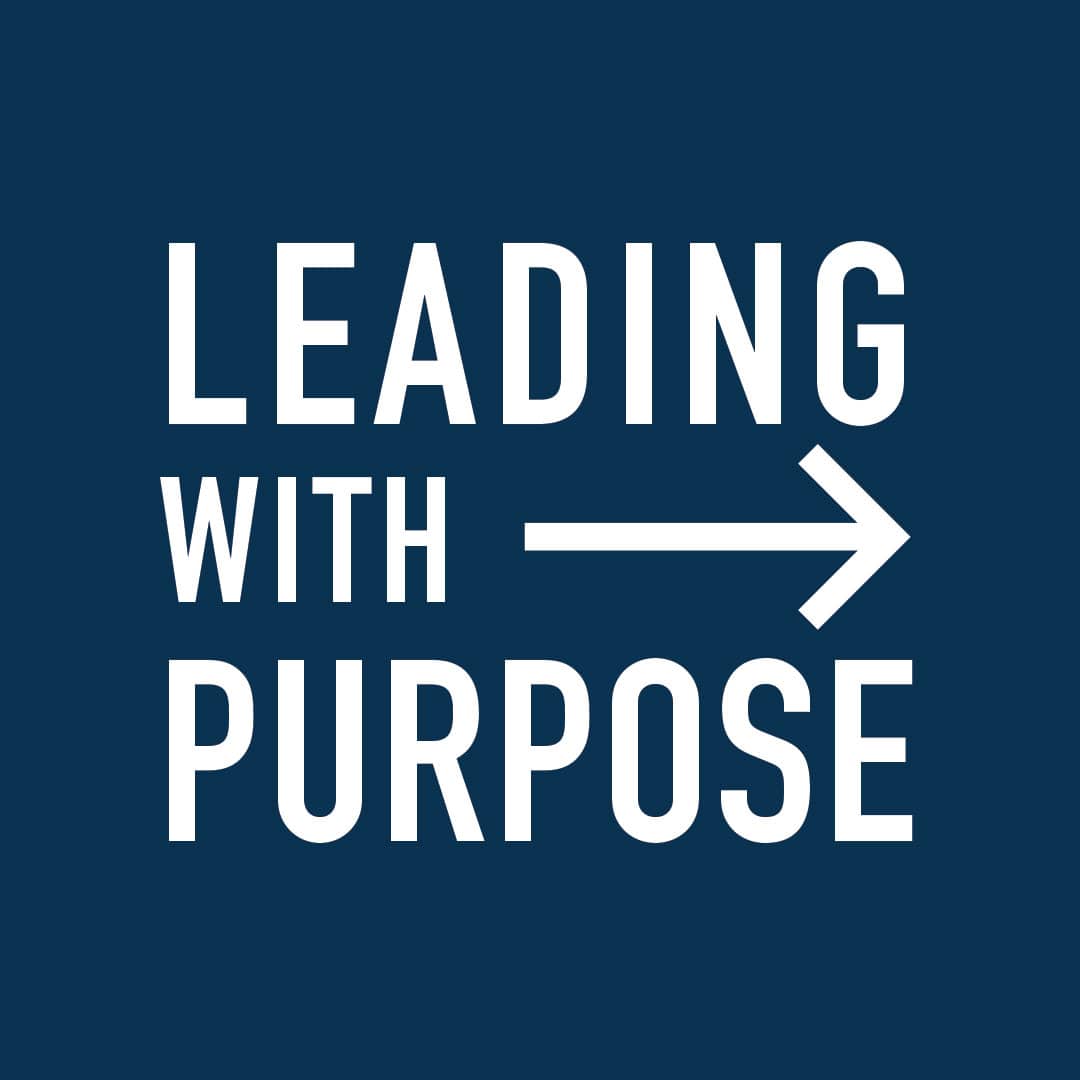Thought Leadership: Ethics in Procurement
Ethics in Procurement Report: The Ethics Alliance
Ethics in Procurement examines the ethical issues and tensions that arise in payment of suppliers, and provides a framework for ensuring fair transactions.
The Ethics Alliance is a corporate community, designed to share challenges and take a collaborative approach to finding solutions. At our inaugural gathering, an Alliance member called out the crippling impact late payments was having on his business. Through conversation, it became evident this was an issue shared by many members and unintentionally caused by others, and was a problem we wanted to help solve.
This guidebook came together after a series of interviews with members and a follow up roundtable discussion that explored both systemic and principle-based solutions. It examines some of the procurement-based issues identified through that process, looking at the causes of ethical tension and offering frameworks for each stage of the procurement process.
Formulated as a practical solution, the paper considers common challenges including:
- Should companies have an open tender and invite all to bid, or save time and money by targeting known suppliers?
- Should companies accept the cheapest complying bid, or pay more to a company that distributes a proportion of its profits to a good cause?
- Should companies be transparent in their dealings with suppliers, or will this open them up to disputes?
- Is it reasonable for companies to impose a significant administrative burden in the first round of a tender process by asking for information which is not directly relevant to the project in question?
Plus, it provides a framework to make payment processes fair, practical and ethical.
"Organisations that are buying goods or services can encounter many forks in the road, requiring decisions on how to respond. By viewing those questions through an ethical lens, we are more able to make decisions that align with the purpose, values, and principles that our organisations are committed to - and that we may hold as individuals."
WHAT'S INSIDE?

Ensuring a fair transaction

Looking after your suppliers

Practical issues to be solved

Reasons you might have a problem

A practical framework

An ethical framework
AUTHORS
Contributors
Writing and Research
Ben Robinson lead the writing and research for this report. He has worked in various roles at The Ethics Centre since 2016. Ben studied Philosophy and Political Economy at the University of Sydney, and is a Graduate Ethics and Sustainability Consultant at Deloitte.
Member contributions
The following Ethics Alliance members generously gave their time to talk to us about the procurement issues affecting their business: Shell Australia, Macquarie Bank, Clayton Utz, The Reserve Bank of Australia, Allianz, TrinityP3, The Business Council of Australia, AIA Australia and Insurance Australia Group (IAG).
A special thank you to Shell Australia who generously shared their market leading approach to procurement with The Ethics Alliance, providing the context and structure for the practical framework offered in this report.
You may also be interested in...
Accountability the missing piece in Business Roundtable statement

Accountability the missing piece in Business Roundtable statement
Opinion + AnalysisBusiness + Leadership
BY Dennis Gentilin The Ethics Centre 3 OCT 2019
Over the past few weeks a lot has been written about the “Statement on the Purpose of a Corporation” issued by the Business Roundtable in the United States.
The Business Roundtable, an association of chief executive officers from America’s leading companies, has shifted its position on who a corporation principally serves.
The original statement, published in 1997, suggested that companies exist to serve its shareholders. The new statement, signed by 163 chief executive officers, states that “While each of our individual companies serves its own corporate purpose, we share a fundamental commitment to all of our stakeholders.”
This “stakeholder approach” to corporate responsibility is not in itself ground-breaking. Nor is it a recent invention. In Johnson and Johnson’s corporate credo developed in 1943, the company lists patients, doctors and nurses as its primary stakeholders, followed by employees, customers, communities and finally shareholders.
Indeed, the shift to a stakeholder approach may not be as profound in practice as some have suggested. Even the Business Roundtable have said that the previous statement “does not accurately describe the ways in which we and our fellow CEOs endeavour every day to create value for all our stakeholders, whose long-term interests are inseparable.”
Given this, it is possible that chief executive officers only support the stakeholder approach to the extent that it benefits both themselves and the shareholder. And we should not necessarily decry this. Adam Smith, sometimes referred to as the “father of economics”, argued that individual self-interest can produce optimal outcomes, the source of his so-called “invisible hand”.
Even Milton Friedman, the much-maligned University of Chicago economist who is often held out as being the most vocal advocate for shareholder primacy, was not ignorant to the possibility that looking after the needs of stakeholders is not necessarily at odds with generating superior returns for shareholders in the long run. Famously, Friedman wrote:
“It may well be in the long-run interest of a corporation that is a major employer in a small community to devote resources to providing amenities to that community or to improving its government. That may make it easier to attract desirable employees, it may reduce the wage bill or lessen losses from pilferage and sabotage or have other worthwhile effects.”
However, as committed as the Business Roundtable might be, circumstances will prevail that are not supportive of the stakeholder approach. Uncompetitive markets result in companies benefiting at the expense of consumers. Seemingly sensible incentive schemes can drive perverse outcomes. And a company’s products, despite being highly valued by its customers, can have broader, deleterious consequences (fossil fuel companies producing carbon dioxide, social media companies empowering covert actors, and technology companies producing “e-waste” are three examples of the latter).
The signatories to the revamped Statement on the Purpose of a Corporation would have you believe that they can be trusted to manage these types of scenarios. We should be cautious taking them at their word. History shows that even well-intentioned chief executives find it extraordinarily difficult to drive the required change in a system where the incentives endorse the status quo. And in some cases, regardless of how hard they might try, they do not have the ability to do so. The most lucid corporate purpose statement won’t save us here.
It is therefore noteworthy that the Business Roundtable has omitted the idea of accountability from its statement. If chief executive officers are serious about serving all stakeholders, how will they be held accountable?
Milton Friedman also had something to say about this. He believed that corporations should conform “to the basic rules of society, both those embodied in law and those embodied in ethical custom.” But more importantly, as laissez faire as he was, he acknowledged that there was a role for government to “enforce compliance” and hold those who don’t “play the game” accountable.
Arguably this is the most important piece of the puzzle. Strong public institutions that develop good policy and hold corporations accountable. It is also the piece that is currently missing.
The recent financial services Royal Commission was a demonstration of what can happen when boundaries are established but not enforced. In a recent speech delivered by Commissioner Kenneth Hayne, he asked us to “grapple closely” with what the seemingly endless calls for Royal Commissions in Australia “are telling us about the state of our democratic institutions.”
But more relevant to this essay, Commissioner Hayne also provided his view on purpose statements and industry codes in the Royal Commission’s final report. He labelled them as mere “public relations puffs”, proposing that the only way they can be effective is by making them enforceable:
“If industry codes are to be more than public relations puffs, the promises made must be made seriously. If they are made seriously (and those bound by the codes say that they are), the promises that are set out in the code … must be kept. This must entail that the promises can be enforced by those to whom the promises are made.”
To be sure, the stance taken by the Business Roundtable should be applauded. Their intentions are without question noble. But more powerful would be a description of how they are going to hold themselves accountable to the statement and create the conditions that deliver value for all their stakeholders over the long-term.
Of course, this exercise would reveal the costs (financial and otherwise) that are associated with being genuinely committed to positive outcomes for all stakeholders. For some chief executive officers, the price would be too high. And because, like all of us, chief executives have their limits, so too does self-regulation.
Ethics in your inbox.
Get the latest inspiration, intelligence, events & more.
By signing up you agree to our privacy policy
You might be interested in…
Opinion + Analysis
Business + Leadership
The Ethics Alliance: Why now?
Opinion + Analysis
Business + Leadership
Self-presentation with the collapse of the back and front stage
WATCH
Business + Leadership, Climate + Environment, Science + Technology
How to build good technology
Opinion + Analysis
Business + Leadership
Let’s cure the cause of society’s ills, and not just treat the symptoms
BY Dennis Gentilin
Dennis Gentilin is an Adjunct Fellow at Macquarie University and currently works in Deloitte’s Risk Advisory practice.
BY The Ethics Centre
The Ethics Centre is a not-for-profit organisation developing innovative programs, services and experiences, designed to bring ethics to the centre of professional and personal life.
The new rules of ethical design in tech

The new rules of ethical design in tech
Opinion + AnalysisBusiness + LeadershipScience + Technology
BY Matthew Beard The Ethics Centre 26 SEP 2019
This article was written for, and first published by Atlassian.
Because tech design is a human activity, and there’s no such thing as human behaviour without ethics.
One of my favourite memes for the last few years is This is Fine. It’s a picture of a dog sitting in a burning building with a cup of coffee. “This is fine,” the dog announces. “I’m okay with what’s happening. It’ll all turn out okay.” Then the dog takes a sip of coffee and melts into the fire.
Working in ethics and technology, I hear a lot of “This is fine.” The tech sector has built (and is building) processes and systems that exclude vulnerable users by designing “nudges” that influence users, users who end up making privacy concessions they probably shouldn’t. Or, designing by hardwiring preconceived notions of right and wrong into technologies that will shape millions of people’s lives.
But many won’t acknowledge they could have ethics problems.

This is partly because, like the dog, they don’t concede that the fire might actually burn them in the end. Lots of people working in tech are willing to admit that someone else has a problem with ethics, but they’re less likely to believe is that they themselves have an issue with ethics.
And I get it. Many times, people are building products that seem innocuous, fun, or practical. There’s nothing in there that makes us do a moral double-take.
The problem is, of course, that just because you’re not able to identify a problem doesn’t mean you won’t melt to death in the sixth frame of the comic. And there are issues you need to address in what you’re building, because tech design is a human activity, and there’s no such thing as human behaviour without ethics.
Your product probably already has ethical issues
To put it bluntly: if you think you don’t need to consider ethics in your design process because your product doesn’t generate any ethical issues, you’ve missed something. Maybe your product is still fine, but you can’t be sure unless you’ve taken the time to consider your product and stakeholders through an ethical lens.
Look at it this way: If you haven’t made sure there are no bugs or biases in your design, you haven’t been the best designer you could be. Ethics is no different – making people (and their products) the best they can be.
Take Pokémon Go, for example. It’s an awesome little mobile game that gives users the chance to feel like Pokémon trainers in the real world. And it’s a business success story, recording a profit of $3 billion at the end of 2018. But it’s exactly the kind of innocuous-seeming app most would think doesn’t have any ethical issues.
But it does. It distracted drivers, brought users to dangerous locations in the hopes of catching Pokémon, disrupted public infrastructure, didn’t seek the consent of the sites it included in the game, unintentionally excluded rural neighbourhoods (many populated by racial minorities), and released Pokémon in offensive locations (for instance, a poison gas Pokémon in the Holocaust Museum in Washington DC).
Quite a list, actually.
This is a shame, because all of this meant that Pokemon Go was not the best game it could be. And as designers, that’s the goal – to make something great. But something can’t be great unless it’s good, and that’s why designers need to think about ethics.
Here are a few things you can embed within your design processes to make sure you’re not going to burn to death, ethically speaking, when you finally launch.
1. Start with ethical pre-mortems
When something goes wrong with a product, we know it’s important to do a postmortem to make sure we don’t repeat the same mistakes. Postmortems happen all the time in ethics. A product is launched, a scandal erupts, and ethicists wind up as talking heads on the news discussing what went wrong.
As useful as postmortems are, they can also be ways of washing over negligent practices. When something goes wrong and a spokesperson says, “We’re going to look closely at what happened to make sure it doesn’t happen again.” I want to say, “Why didn’t you do that before you launched?” That’s what an ethical premortem does.
Sit down with your team and talk about what would make this product an ethical failure. Then work backwards to the root causes of that possible failure. How could you mitigate that risk? Can you reduce the risk enough to justify going forward with the project? Are your systems, processes and teams set up in a way that enables ethical issues to be identified and addressed?
Tech ethicist Shannon Vallor provides a list of handy premortem questions:
- How Could This Project Fail for Ethical Reasons?
- What Would be the Most Likely Combined Causes of Our Ethical Failure/Disaster?
- What Blind Spots Would Lead Us Into It?
- Why Would We Fail to Act?
- Why/How Would We Choose the Wrong Action?
What Systems/Processes/Checks/Failsafes Can We Put in Place to Reduce Failure Risk?
2. Ask the Death Star question
The book Rogue One: Catalyst tells the story of how the galactic empire managed to build the Death Star. The strategy was simple: take many subject matter experts and get them working in silos on small projects. With no team aware of what other teams were doing, only a few managers could make sense of what was actually being built.
Small teams, working in a limited role on a much larger project, with limited connection to the needs, goals, objectives or activities of other teams. Sound familiar? Siloing is a major source of ethical negligence. Teams whose workloads, incentives, and interests are limited to their particular contribution seldom can identify the downstream effects of their contribution, or what might happen when it’s combined with other work.
While it’s unlikely you’re secretly working for a Sith Lord, it’s still worth asking:
- What’s the big picture here? What am I actually helping to build?
- What contribution is my work making and are there ethical risks I might need to know about?
- Are there dual-use risks in this product that I should be designing against?
- If there are risks, are they worth it, given the potential benefits?
3. Get red teaming
Anyone who has worked in security will know that one of the best ways to know if a product is secure is to ask someone else to try to break it. We can use a similar concept for ethics. Once we’ve built something we think is great, ask some people to try to prove that it isn’t.
Red teams should ask:
- What are the ethical pressure points here?
- Have you made trade-offs between competing values/ideals? If so, have you made them in the right way?
- What happens if we widen the circle of possible users to include some people you may not have considered?
- Was this project one we should have taken on at all? (If you knew you were building the Death Star, it’s unlikely you could ever make it an ethical product. It’s a WMD.)
- Is your solution the only one? Is it the best one?
4. Decide what your product’s saying
Ever seen a toddler discover a new toy? Their first instinct is to test the limits of what they can do. They’re not asking What was the intention of the designer, they’re testing how the item can satisfy their needs, whatever they may be. In this case they chew it, throw it, paint with it, push it down a slide… a toddler can’t access the designer’s intention. The only prompts they have are those built into the product itself.
It’s easy to think about our products as though they’ll only be used in the way we want them to be used. In reality, though, technology design and usage is more like a two-way conversation than a set of instructions. Given this, it’s worth asking: if the user had no instructions on how to use this product, what would they infer purely from the design?
For example, we might infer from the hidden-away nature of some privacy settings on social media platforms that we shouldn’t tweak our privacy settings. Social platforms might say otherwise, but their design tells a different story. Imagine what your product would be saying to a user if you let it speak for itself.
This is doubly important, because your design is saying something. All technology is full of affordances – subtle prompts that invite the user to engage with it in some ways rather than others. They’re there whether you intend them to be or not, but if you’re not aware of what your design affords, you can’t know what messages the user might be receiving.
Design teams should ask:
- What could a infer from the design about how a product can/should be used?
- How do you want people to use this?
- How don’t you want people to use this?
- Do your design choices and affordances reflect these expectations?
- Are you unnecessarily preventing other legitimate uses of the technology?
5. Don’t forget to show your work
One of the (few) things I remember from my high school math classes is this: you get one mark for getting the right answer, but three marks for showing the working that led you there.
It’s also important for learning: if you don’t get the right answer, being able to interrogate your process is crucial (that’s what a post-mortem is).
For ethical design, the process of showing your work is about being willing to publicly defend the ethical decisions you’ve made. It’s a practical version of The Sunlight Test – where you test your intentions by asking if you’d do what you were doing if the whole world was watching.
Ask yourself (and your team):
- Are there any limitations to this product?
- What trade-offs have you made (e.g. between privacy and user-customisation)?
- Why did you build this product (what problems are you solving?)
- Does this product risk being misused? If so, what have you done to mitigate those risks?
- Are there any users who will have trouble using this product (for instance, people with disabilities)? If so, why can’t you fix this and why is it worth releasing the product, given it’s not universally accessible?
- How probable is it that the good and bad effects are likely to happen?
Ethics is an investment
I’m constantly amazed at how much money, time and personnel organisations are willing to invest in culture initiatives, wellbeing days and the like, but who haven’t spent a penny on ethics. There’s a general sense that if you’re a good person, then you’ll build ethical stuff, but the evidence overwhelmingly proves that’s not the case. Ethics needs to be something you invest in learning about, building resources and systems around, recruiting for, and incentivising.
It’s also something that needs to be engaged in for the right reasons. You can’t go into this process because you think it’s going to make you money or recruit the best people, because you’ll abandon it the second you find a more effective way to achieve those goals. A lot of the talk around ethics in technology at the moment has a particular flavour: anti-regulation. There is a hope that if companies are ethical, they can self-regulate.
I don’t see that as the role of ethics at all. Ethics can guide us toward making the best judgements about what’s right and what’s wrong. It can give us precision in our decisions, a language to explain why something is a problem, and a way of determining when something is truly excellent. But people also need justice: something to rely on if they’re the least powerful person in the room. Ethics has something to say here, but so do law and regulation.
If your organisation says they’re taking ethics seriously, ask them how open they are to accepting restraint and accountability. How much are they willing to invest in getting the systems right? Are they willing to sack their best performer if that person isn’t conducting themselves the way they should?
Ethics in your inbox.
Get the latest inspiration, intelligence, events & more.
By signing up you agree to our privacy policy
You might be interested in…
Opinion + Analysis
Business + Leadership
The sponsorship dilemma: How to decide if the money is worth it
Opinion + Analysis
Business + Leadership
Moral injury is a new test for employers
Opinion + Analysis
Business + Leadership
Ethical issues and human resource development: some thoughts
Opinion + Analysis
Business + Leadership, Science + Technology
MIT Media Lab: look at the money and morality behind the machine
BY Matthew Beard
Matt is a moral philosopher with a background in applied and military ethics. In 2016, Matt won the Australasian Association of Philosophy prize for media engagement. Formerly a fellow at The Ethics Centre, Matt is currently host on ABC’s Short & Curly podcast and the Vincent Fairfax Fellowship Program Director.
BY The Ethics Centre
The Ethics Centre is a not-for-profit organisation developing innovative programs, services and experiences, designed to bring ethics to the centre of professional and personal life.
MIT Media Lab: look at the money and morality behind the machine

MIT Media Lab: look at the money and morality behind the machine
Opinion + AnalysisBusiness + LeadershipScience + Technology
BY Matthew Beard 18 SEP 2019
When convicted sex offender, alleged sex trafficker and financier to the rich and famous Jeffrey Epstein was arrested and subsequently died in prison, there was a sense that some skeletons were about to come out of the closet.
However, few would have expected that the death of a well-connected, social high-flying predator would call into disrepute one of the world’s most reputable AI research labs. But this is 2019, so anything can happen. And happen it has.
Two weeks ago, New Yorker magazine’s Ronan Farrow reported that Joi Ito, the director of MIT’s prestigious Media Lab, which aims to “focus on the study, invention, and creative use of digital technologies to enhance the ways that people think, express, and communicate ideas, and explore new scientific frontiers,” had accepted $7.5 million in anonymous funding from Epstein, despite knowing MIT had him listed as a “disqualified donor” – presumably because of his previous convictions for sex offences.
Emails obtained by Farrow suggest Ito wrote to Epstein asking for funding to continue to pay staff salaries. Epstein allegedly procured donations from other philanthropists – including Bill Gates – for the Media Lab, but all record of Epstein’s involvement was scrubbed.
Since this has been made public, Ito – who lists one of his areas of expertise as “the ethics and governance of technology” – has resigned. The funding director who worked with Ito at MIT, Peter Cohen, now working at another university, has been placed on administrative leave. Staff at MIT Media Lab have resigned in protest and others are feeling deeply complicit, betrayed and disenchanted at what has transpired.
What happened at MIT’s Media Lab is an important case study in how the public conversation around the ethics of technology needs to expand to consider more than just the ethical character of systems themselves. We need to know who is building these systems, why they’re doing so and who is benefitting. In short, ethical considerations need to include a supply chain analysis of how the technology came to be created.
This is important is because technology ethics – especially AI ethics – is currently going through what political philosopher Annette Zimmerman calls a “gold rush”. A range of groups, including The Ethics Centre, are producing guides, white papers, codes, principles and frameworks to try to respond to the widespread need for rigorous, responsive AI ethics. Some of these parties genuinely want to solve the issues; others just want to be able to charge clients and have retail products ready to go. In either case, the underlying concern is that the kind of ethics that gets paid gets made.
For instance, funding is likely to dictate where the world’s best talent is recruited and what problems they’re asked to solve. Paying people to spend time thinking about these issues, providing the infrastructure for multidisciplinary (or in MIT Media Lab’s case, “anti disciplinary”) groups to collaborate is expensive. Those with money will have a much louder voice in public and social debates around AI ethics and have considerable power to shape the norms that will eventually shape the future.
This is not entirely new. Academic research – particularly in the sciences – has always been fraught. It often requires philanthropic support, and it’s easy to rationalise the choice to take this from morally questionable people and groups (and, indeed, the downright contemptible). Vox’s Kelsey Piper summarised the argument neatly: “Who would you rather have $5 million: Jeffrey Epstein, or a scientist who wants to use it for research? Presumably the scientist, right?”
What this argument misses, as Piper points out, is that when it comes to these kinds of donations, we want to know where they’re coming from. Just as we don’t want to consume coffee made by slave labour, we don’t want to chauffeured around by autonomous vehicles whose AI was paid for by money that helped boost the power and social standing of a predator.
More significantly, it matters that survivors of sexual violence – perhaps even Epstein’s own – might step into vehicles, knowingly or not, whose very existence stemmed from the crimes whose effects they now live with.
Paying attention to these concerns is simply about asking the same questions technology ethicists already ask in a different context. For instance, many already argue that the provenance of a tech product should be made transparent. In Ethical by Design: Principles for Good Technology, we argue that:
The complete history of artefacts and devices, including the identities of all those who have designed, manufactured, serviced and owned the item, should be freely available to any current owner, custodian or user of the device.
It’s a natural extension of this to apply the same requirements to the funding and ownership of tech products. We don’t just need to know who built them, perhaps we also need to know who paid for them to be built, and who is earning capital (financial or social) as a result.
AI and data ethics have recently focused on concerns around the unfair distribution of harms. It’s not enough, many argue, that an algorithm is beneficial 95% of the time, if the 5% who don’t benefit are all (for example) people with disabilities or from another disadvantaged, minority group. We can apply the same principle to the Epstein funding: if the moral costs of having AI funded by a repeated sex offender are borne by survivors of sexual violence, then this is an unacceptable distribution of risks.
MIT Media Lab, like other labs around the world, literally wants to design the future for all of us. It’s not unreasonable to demand that MIT Media Lab and other groups in the business of designing the future, design it on our terms – not those of a silent, anonymous philanthropist.
Ethics in your inbox.
Get the latest inspiration, intelligence, events & more.
By signing up you agree to our privacy policy
You might be interested in…
Opinion + Analysis
Business + Leadership, Health + Wellbeing, Relationships
Ending workplace bullying demands courage
Explainer
Business + Leadership
Ethics Explainer: Social license to operate
Opinion + Analysis
Health + Wellbeing, Business + Leadership
The ethical dilemma of the 4-day work week
Opinion + Analysis
Health + Wellbeing, Business + Leadership
The ethics of workplace drinks, when we’re collectively drinking less
BY Matthew Beard
Matt is a moral philosopher with a background in applied and military ethics. In 2016, Matt won the Australasian Association of Philosophy prize for media engagement. Formerly a fellow at The Ethics Centre, Matt is currently host on ABC’s Short & Curly podcast and the Vincent Fairfax Fellowship Program Director.
The invisible middle: why middle managers aren't represented

The invisible middle: why middle managers aren’t represented
Opinion + AnalysisBusiness + Leadership
BY Cris Parker Cris 29 AUG 2019
The empty chair on stage was more than symbolic when The Banking and Finance Oath (BFO) was hosting a panel discussion on who holds the responsibility of culture within an organisation. In months of preparation, I had not found one middle manager who was willing or able to contribute to the discussion.
A chairman, director, CEO, HR specialist and a professor settled into their places, ready to give their opinions on the role they played in developing culture. The empty space at this event, three years ago, spoke volumes about the invisibility and voicelessness of those who have been promoted to manage others, but have little actual decision-making power.
Middle managers are often in the crossfire when it comes to apportioning blame for the failure to transform an organisation’s culture or to enact strategy. I have heard them derisively called “permafrost”, as if they are frozen into position and will only move with the application of a blowtorch.
“Culture Blockers” is another well-used epithet.
Middle managers are typically those people who head departments, business units, or who are project managers. It is their responsibility to implement the strategy that is imposed from above them and may have two management levels below them.
Over the past 20 years, the ranks of the middle managers have been slashed as organisations cut out unnecessary costs and aim towards flatter hierarchies. Those occupying the surviving positions may be characterised like this:
- They are often managing people for the first time and offered little training to deal with professional development, project management, time management and conflict resolution
- They may have been promoted because of their technical competence, rather than management ability
- Their management responsibilities may be added on top of what they were already doing before being promoted
- They have responsibility, but little formal authority
- They may have limited budget
- They are charged with enacting policy and embedding values, but may not be given the context or the “why”
- They have little autonomy or flexibility and may lack a sense of purpose.
All these characteristics make middle management a highly stressful position. Two large US studies found that people who work at this level are more likely to suffer depression (18 per cent of supervisors and managers) and had the lowest levels of job satisfaction.
“I don’t know any middle manager that feels like they’re doing a good job”, a middle manager recently told me.
However, the reason we need to pay attention to our middle managers is more than just concern for their welfare. Strategies and cultural change will fail if they are not supported and motivated. They are the custodians of culture and some would argue the creators, as people observe their behaviour as guidance for their own.
“We know what good looks like, but we’re not set up for success”, confided another middle manager.
Stanford University professor, Behnam Tabrizi, studied large-scale change and innovation efforts in 56 randomly selected companies and found that the 32 per cent that succeeded in their efforts could thank the involvement of their middle managers.
“In those cases, mid-level managers weren’t merely managing incremental change; they were leading it by working levers of power up, across and down in their organisations,” he wrote in the Harvard Business Review in 2016.
As more evidence that middle managers are intrinsic to a business’ success, Google founders Larry Page and Sergey Brin decided they could do without managers in the early days of the company in 2002. However, their experiment with a manager-less organisation only lasted a few months.
“They relented when too many people went directly to Page with questions about expense reports, interpersonal conflicts, and other nitty-gritty issues. And as the company grew, the founders soon realized that managers contributed in many other, important ways—for instance, by communicating strategy, helping employees prioritise projects, facilitating collaboration, supporting career development, and ensuring that processes and systems aligned with company goals,” wrote David Garvin, the C. Roland Christensen Professor at Harvard Business School.
With all of this in mind, you may think business leaders would now be seeking the views of their middle managers, to engage them in the cultural change required to regain public trust after the Royal Commission into Misconduct in the Banking, Superannuation and Financial Services Industry and other recent scandals. But sadly, no.
Just this month at The BFO conference, I was again presenting a panel discussion on the plight of middle managers. Prior to the day, two of the middle management participants – despite one being nominated by a senior leader – were pulled and additionally, the discussion was ruled Chatham House with journalists being asked to leave the room. Although I saw a glimpse of positivity, my research leading up to the discussion would suggest very little has changed and this issue is not limited to financial services.
While senior leaders are working tirelessly to overcome challenges in this transitional time, part of the answer is right in front of them (well, below them) – their hard-working middle managers. But first, they have to make the effort to engage them with appreciation, seek their views with empathy, and involve them in the formulation of strategy.

This article was originally written for The Ethics Alliance. Find out more about this corporate membership program. Already a member? Log in to the membership portal for more content and tools here.
Ethics in your inbox.
Get the latest inspiration, intelligence, events & more.
By signing up you agree to our privacy policy
You might be interested in…
Opinion + Analysis
Business + Leadership
Leading ethically in a crisis
Opinion + Analysis
Business + Leadership, Science + Technology
5 dangerous ideas: Talking dirty politics, disruptive behaviour and death
Opinion + Analysis
Business + Leadership
Let the sunshine in: The pitfalls of radical transparency
Opinion + Analysis
Business + Leadership
Tim Walker on finding the right leader
Join our newsletter
BY Cris Parker
Cris Parker is the former Head of The Ethics Alliance and a Director of the Banking and Finance Oath at The Ethics Centre.
BY Cris
What are millennials looking for at work?

What are millennials looking for at work?
Opinion + AnalysisBusiness + Leadership
BY The Ethics Alliance Cris 29 AUG 2019
Kat Dunn had a big life, but it wasn’t fulfilling. She was the youngest executive to serve on the senior leadership team of fund manager Perpetual Limited, but she went home each night feeling empty.
The former mergers and acquisitions lawyer tossed in the job two years ago and found her way into the non-profit sector, as CEO of the charity and social business promoter Grameen Australia.
Grameen Australia aims to take Social Business mainstream in Australia by scaling and starting up social businesses and advising socially-minded institutions on how to do the same.
Dunn says Millennials are more interested in “purpose” than money and security. She was speaking at the Crossroads: The 2019 Banking and Finance Oath Conference in Sydney in August.
Dunn said Perpetual tried to talk her out of leaving the fund manager. “I think they thought that I was going through some sort of early-onset midlife crisis.
“Because, after all, what sane person would give up a prestigious job, good money at the age of 33 when my priority should have been financial security, even more status, and chasing those last two rungs to get to be CEO of a listed company?”
‘I was living the dream’
Dunn said she was conditioned to believe she should want to climb the corporate ladder and make a lot of money.
“At 32 years old, I was appointed to be the youngest senior executive on the senior leadership team. The year before, I had just done $3 billion worth of deals in 18 months. I was, as some would say, living the dream,” said Dunn.
“So, you can imagine how disillusioned I felt when I went home every night feeling like I was a fraud. I was wondering how I could possibly reconcile my career with my identity of myself as an ethical person”.
Dunn had been put in charge of building the company’s continuous improvement program, but the move proved a disappointment. “I was so green because I thought [the role] meant I had the privilege of actually making things better for my colleagues.
“Later, I realised that it was just code for riskless cost-cutting … and impossible-to-achieve growth targets.”
Dunn said she had childhood aspirations to help create a sustainable future. “But, instead, I found myself perpetuating the very system of greed that I had vowed to change.”
“My whole career, I was told I had to make a choice between making a living or making a difference. I couldn’t do both and I found that deeply unsettling. I had cognitive dissonance.”
A desire to do work that matters
Dunn made the point that her motivations are shared by many – and not just be Millennials (she just scrapes over the line into Generation X).
By 2025, 75 per cent of the workforce will be Millennials (born between 1980 and 2000) and only 13 per cent of millennials say that their career goal involves climbing the corporate ladder, 60 per cent have aspirations to leave their companies in the next three years.
Moreover, 66 per cent of Millennials say their career goals involve starting their own business, according to a study by Bentley University.
“A steady paycheque and self-interest are not the primary drivers for many Millennials any more. The desire to do work that matters is,” said Dunn.
“Growing up poor, I thought that money would make me happy. I thought it would give me
security and social standing. I thought that if I ticked all of the boxes, that I would be free.
“At the height of my corporate career, though, I was anything but. I felt that making profits for profit’s sake was just deeply unfulfilling. For me, it was just the opposite of fulfilling – it caused me fear, distress and this stinging sense of isolation.
“What was strange is that no one else seemed to be outwardly admitting to feeling the same.”
The vision was impaired
Dunn recalled talking to a peer about strategy at the time and saying to him ‘I think our vision is wrong’.
She told him: “Our vision is to be Australia’s largest and most trusted independent wealth manager. I think it’s wrong. It’s not actually a vision. It’s a metric on some imaginary league table and it’s all about us.
“It doesn’t say anything about creating anything of value for anyone else.”
Her colleague retorted: “Kat, we have bigger fish to fry than our vision”.
She knew, at that point, she would not realise her potential in that environment.
Aaron Hurst, the author of the book, The Purpose Economy, predicts that purpose is going to be the primary organising principle for the fourth [entrepreneurial] economy.
He defines “purpose” as the experience of three things: personal growth, connection and impact.
“When he wrote the book, five years ago, Hurst said that by 2020, CEOs expected
demands for purpose in the consumer marketplace would increase by 300 per cent,” said Dunn.
“Now, what that means is that consumers deprioritise cost, convenience and function and make decisions based on their need to increase meaning in their lives.”
Dunn says that, as Millennials take on more leadership roles, this trend will become more evident in the job market.
“When you talk about how hard it is to find top talent to work in the industry, it is worthwhile knowing that for the top talent – the future leaders of the industry, of our country, our planet – work isn’t just about money.
“It is a vehicle to self-actualisation. They don’t just want to work nine-to-five for a secure income, they actually want to run through brick walls if it means they get to do work that they believe in, within a culture of integrity, for a purpose that leaves the world in a better place than they found it,
And they want to work in a place that develops not only their skills, but sharpens their character.”
Dunn said that when she left her corporate job, she would not have believed that the financial services industry could build a better society and a sustainable future.
However, she changed her mind when she learned about Grameen Bank, microfinance and social business.

This article was originally written for The Ethics Alliance. Find out more about this corporate membership program. Already a member? Log in to the membership portal for more content and tools here.
Ethics in your inbox.
Get the latest inspiration, intelligence, events & more.
By signing up you agree to our privacy policy
You might be interested in…
Opinion + Analysis
Business + Leadership, Health + Wellbeing
Tips on how to find meaningful work
Opinion + Analysis
Business + Leadership
Our economy needs Australians to trust more. How should we do it?
Opinion + Analysis
Business + Leadership
It’s time to talk about life and debt
Opinion + Analysis
Science + Technology, Business + Leadership
3 things we learnt from The Ethics of AI
Join our newsletter
BY The Ethics Alliance
The Ethics Alliance is a community of organisations sharing insights and learning together, to find a better way of doing business. The Alliance is an initiative of The Ethics Centre.
BY Cris
Following a year of scandals, what's the future for boards?

Following a year of scandals, what’s the future for boards?
Opinion + AnalysisBusiness + Leadership
BY Fiona Smith Cris 28 AUG 2019
As guardians of moral behaviour, company boards continue to be challenged. After a year of wall-to-wall scandals, especially within the Banking and Finance sector, many are asking whether there are better ways to oversee what is going on in a business.
A series of damning inquiries, including the recent Royal Commission into Financial Services, has spurred much discussion about holding boards to account – but far less about the structure of boards and whose interests they serve.
Ethicist Lesley Cannold expressed her frustration at this state of affairs in a speech to the finance industry, saying the Royal Commission was a lost opportunity to look at “root and branch” reform.
“We need to think of changes that will propel different kinds of leaders into place and rate their performance according to different criteria – criteria that relate to the wellbeing of a range of stakeholders, not just shareholders,” she said at the Crossroads: The 2019 Banking and Finance Oath Conference in Sydney in August.
This issue is close to the heart of Andrew Linden, PhD researcher on German corporate governance and a sessional Lecturer in RMIT’s School of Management. Linden favours the German system of having an upper supervisory board, with 50 per cent of directors elected by employees, and a lower management board to handle the day-to-day operations.
This system was imposed on the Germans after World War II to ensure companies were more socially responsible but, despite its advantages, has not spread to the English-speaking world, says Linden.
“For 40 years, corporate Australia has been allowed to get away with the idea that all they had to do was to serve shareholders and to maximise the value returned to shareholders.
“Now, that’s never been a feature of the Corporate Law. And directors have had very specific duties, publicly imposed duties, that they ought to have been fulfilling – but they haven’t.”
It is the responsibility of directors of public companies to govern in the corporation’s best interests and also ensure that corporations do not impose costs on the wider community, he says.
“All these piecemeal responses to the Banking Royal Commission are just Band-Aids on bullet wounds. They are not actually going to fix the problem. All through these corporate governance debates, there has not been too much of a focus on board design.”
The German solution – a two-tier model
This board structure, proposed by Linden, would have non-executive directors on an upper (supervisory) board, which would be legally tasked with monitoring and control, approving strategy and appointing auditors.
A lower management board would have executive directors responsible for implementing the approved strategy and day-to-day management.
This structure would separate non-executive from executive directors and create clear, legally separate roles for both groups, he says.
“Research into European banks suggests having employee and union representation on supervisory boards, combined with introduction of employee elected works councils to deal with management over day-to-day issues, reduces systemic risk and holds executives accountable,” according to Linden, who wrote about the subject with Warren Staples (senior lecturer in Management, RMIT University) in The Conversation last year.
Denmark, Norway and Sweden also have employee directors on corporate boards and the model is being proposed in the US by Democratic presidential hopefuls, including Senators Elizabeth Warren and Bernie Sanders.
As Linden said, “All the solutions that people in the English-speaking world typically think about are ownership-based solutions. So, you either go for co-operative ownership as an alternative to shareholder ownership, or, alternatively, it’s public ownership. All of these debates over decades have been about ‘who are the best owners’, not necessarily about the design of their governing bodies.”
Linden says research shows the riskiest banks are those that are English-speaking, for-profit, shareholder-dominated, overseen by an independent-director-dominated board.
“And they have been the ones that have imposed the most cost on communities,” he says.
Outsourcing the board
Allowing consultant-like companies to oversee governance is a solution proposed by two law academics in the US, who say they are “trying to encourage people to innovate in governance in ways that are fundamentally different than just little tweaks at the edges”.
Law professors Stephen Bainbridge (UCLA) and Todd Henderson (University of Chicago) say organisations are familiar with the idea of outsourcing responsibilities to lawyers, accountants, financial service providers.
“We envision a corporation, say Microsoft or ExxonMobil, hiring another company, say Boards-R-Us, to provide it with director services, instead of hiring 10 or so separate ‘companies’ to do so,” Henderson explained in an article.
“Just as other service firms, like Kirkland and Ellis, McKinsey and Company, or KPMG, are staffed by professionals with large support networks, so too would BSPs [board service providers] bring the various aspects of director services under a single roof. We expect the gains to efficiency from such a move to be quite large.
“We argue that hiring a BSP to provide board services instead of a loose group of sole proprietorships [non-executive directors] will increase board accountability, both from markets and judicial supervision.”
Outsourcing to specialists is a familiar concept, said Bainbridge in a video interview with The Conference Board.
“Would you rather deal with you know twelve part-timers who get hired in off the street, or would you rather deal with a professional with a team of professionals?”
Your director is a robot
A Hong Kong venture capital firm, Deep Knowledge Ventures, appointed the first-ever robot director to its board in 2014, giving it the power to veto investment decisions deemed as too risky by its artificial intelligence.
Australia’s Chief Scientist, Dr Alan Finkel, told company directors that he had initially thought the robo-director, named Vital, was a mere publicity stunt.
However, five years on “… the company is still in business. Vital is still on the Board. And waiting in the wings is her successor: Vital 2.0,” Finkel said at a governance summit held by the Australian Institute of Company Directors in March.
“The experiment was so successful that the CEO predicts we’ll see fully autonomous companies – able to operate without any human involvement – in the coming decade.
Stop and think about it: fully autonomous companies able to operate without any human involvement. There’d be no-one to come along to AICD summits!”
Dr Finkel reassured his audience that their jobs were safe … for now.
“… those director-bots would still lack something vital – something truly vital – and that’s what we call artificial general intelligence: the digital equivalent of the package deal of human abilities, human insights and human experiences,” he said.
“The experts tell us that the world of artificial general intelligence is unlikely to be with us until 2050, perhaps longer. Thus, shareholders, customers and governments who want that package deal will have to look to you for quite some time,” he told the audience.
“They will rely on the value that you, and only you, can bring, as a highly capable human being, to your role.”
Linden agrees that robo-directors have limitations and that, before people get too excited about the prospect of technology providing the solution to governance, they need to get back to basics.
“All these issues to do with governance failures get down to questions of ethics and morality and lawfulness – on making judgments about what is appropriate conduct,” he says, adding that it was “hopelessly naïve” to expect machines to be able to make moral judgements.
“These systems depend on who designs them, what kind of data goes into them. That old analogy ‘garbage in, garbage out’ is just as applicable to artificial intelligence as it is to human systems.”

This article was originally written for The Ethics Alliance. Find out more about this corporate membership program. Already a member? Log in to the membership portal for more content and tools here.
Ethics in your inbox.
Get the latest inspiration, intelligence, events & more.
By signing up you agree to our privacy policy
You might be interested in…
Opinion + Analysis
Business + Leadership
The invisible middle: why middle managers aren’t represented
Opinion + Analysis
Business + Leadership
Corporate tax avoidance: you pay, why won’t they?
Opinion + Analysis
Business + Leadership
Ask an ethicist: How to approach differing work ethics between generations?
Opinion + Analysis
Business + Leadership, Science + Technology
Is it ok to use data for good?
Join our newsletter
BY Fiona Smith
Fiona Smith is a freelance journalist who writes about people, workplaces and social equity. Follow her on Twitter @fionaatwork
BY Cris
How BlueRock uses culture to attract top talent

How BlueRock uses culture to attract top talent
Opinion + AnalysisBusiness + Leadership
BY The Ethics Alliance Cris 28 AUG 2019
Glossy highrises form a wall of corporate Australia along the Yarra River. The size of those companies and the magnetism of their brand names easily attract talented people and the attractions of big businesses are obvious.
These giants offer world-leading working conditions and benefits, career advancement, important work for powerful clients and the chance to work overseas.
Even still, people leave these big businesses for smaller ones all the time. And the reasons they quit can provide useful ammunition for those pointy-elbowed entrepreneurs who would love to get them on board.
A few blocks back from the river in Melbourne is the office of professional services firm, BlueRock, which started as an accounting business 11 years ago by five “escapees” from corporate Australia.
Today, the firm has around 170 employees and has diversified into areas such as law, private wealth, finance and insurance. Last year, they made it to fourth place on the Great Place To Work list for companies with between 100 and 999 employees.
It was also a finalist in the employer of choice category of the Lawyers Weekly 2019 Law Awards.
COO of the BlueRock, Dean Godfrey, says the biggest challenge in competing with the big firms is to attract graduates or to recruit people who are in the first half of their careers.
“There is still some prestige in going to some of the other more structured, high profile organisations,” he says. “When people are starting out, they don’t always know what they want.”
However, he says people who have had experience working for the big firms find they enjoy life more at BlueRock. “It is about having fun while you do it, working with like-minded people and understanding that the grass isn’t greener on the other side.”
Reasonable hours
Godfrey says people who make the move to BlueRock from big “churn-and-burn” firms often talk about wanting more purpose in their lives and getting away from the long hours culture.
“It is more about getting the job done than having prescriptive rules around having to be there,” he says.
Godfrey says BlueRock tries to ensure its clients – who are mostly business owners – share its vision for a healthy workplace.
The legal division distinguished itself by having less reliance on hourly-billing, which is the traditional way that lawyers’ time is charged out, but also a contributor to high stress levels in the practice of law.
Variety
One of the benefits of being in a smaller company is that employees are often given a broader range of experiences. “People in those larger firms almost cut their teeth on monotony, doing something really, really, really well,” says Godfrey.
Social purpose
BlueRock aspires to become a social enterprise and achieved B-Corp certification in 2017. This means it is legally required to consider the impact of their decisions on their workers, customers, suppliers, community, and the environment.
The challenge of B-Corp is that companies have to continue to improve to maintain their accreditation.
Godfrey says people who want to leave large firms often say they want to find more meaning in their work.
“You see people who have been in those businesses looking for something different. They may like the accounting stream or law stream or finance stream, but they want to be part of something that looks after its community,” he says.
BlueRock is working on becoming carbon-neutral and is phasing out its printers, is composting waste and considering more environmental lighting solutions. The firm is also reassessing its supply chain and the B-Corp status of its suppliers.
“We want to make sure they are putting their money where their mouth is,” he says.
BlueRock has partnered with B1G1 (Business For Good), a global giving initiative whereby every transaction made in a business “earns” a donation.
Employee ownership
Any employee of BlueRock is eligible to invest in the company and about one-third of staff have participated.
Unlike larger firms, where is it only the partners or those at senior levels who can become owners, the BlueRock founders determined that the people who work in the business should also be able to have a stake in the wealth and direction of the firm.
“It really does give you a feeling like you are a part of what we’re building,” says Godfrey.
As a firm that is focused on its entrepreneur clients, employees at BlueRock are also encouraged to have their own businesses.
Fun
The funky office space, which includes a giant chessboard and a unicorn sculpture, signals the company does not want to be seen as your usual professional services firm. The website promises fun activities and healthy food options and a range of flexible work options.
Managing director of BlueRock, Peter Lalor, has said people are left to decide how they do their work:
“Our philosophy is quite different: if we just let people get on with the job of working stuff out in a really smart, efficient way, they’ll get the right answer,” he said in a podcast.
“And I think that there’s a little bit of combativeness in people when they’re told they have to do something … They rebel against it. So, by having little to no structure in terms of how we do what we do, and no rules per se, people feel very empowered to get on with the job.”

This article was originally written for The Ethics Alliance. Find out more about this corporate membership program. Already a member? Log in to the membership portal for more content and tools here.
Ethics in your inbox.
Get the latest inspiration, intelligence, events & more.
By signing up you agree to our privacy policy
You might be interested in…
Opinion + Analysis
Business + Leadership
Why purpose, values, principles matter
LISTEN
Business + Leadership
Leading With Purpose
Opinion + Analysis
Business + Leadership, Relationships
The twin foundations of leadership
Opinion + Analysis
Business + Leadership
How to improve your organisation’s ethical decision-making
BY The Ethics Alliance
The Ethics Alliance is a community of organisations sharing insights and learning together, to find a better way of doing business. The Alliance is an initiative of The Ethics Centre.
BY Cris
The truth isn't in the numbers

The truth isn’t in the numbers
Opinion + AnalysisBusiness + Leadership
BY Fiona Smith Cris 27 AUG 2019
If you want to work out what the people are thinking, one thing is for sure, you can’t just go out and ask them.
The failures of political polling over recent elections have taught us that opinion surveys can no longer be trusted. If you were betting on the winner, you would have been better off putting your money on the predicted losers.
This was a $5.2 million lesson for betting company Sportsbet when it pre-emptively paid out Bill Shorten backers – two days early – based on the fact that seven out of every ten wagers supported a Labor win in May. Labor lost, the gamblers got it wrong.
And it is not just the polling and betting companies that have lost credibility as truth-telling tools. Science is having its own crisis over the quality of peer-reviewed research.
Just one sleuth, John Carlisle (an anaesthetist in the UK with time on his hands) has discovered problems in clinical research, leading to the retraction and correction of hundreds of papers because of misconduct and mistakes.
The world of commerce is no better at ensuring that decisions are backed by valid, scientific research. Too often, companies employ consultants who design feedback surveys to tell clients what they want to hear, or employers hire people based on personality questionnaires of dubious provenance.
Things are further complicated by poor survey questions, untruthful answers, failures of memory and survey fatigue (36 per cent of employees report receiving surveys regularly, three or more times per year).
Why bother?
All of this may give rise to the notion that asking people for their opinion is an utter waste of time. However, that is not the conclusion drawn by Adrian Barnett, president of the Statistical Society of Australia and professor at the Queensland University of Technology.
Barnett, who studies the value of health and medical research, says people should view all surveys with a healthy skepticism, but there is no substitute for a survey with a good representative sample.
“I do think there is a problem, yes, but it is potentially overblown, or overstated” he says.
“We know that, in theory, we can find out what the whole population is feeling by taking just a small sample and extrapolating up. We know it works and it’s a brilliant, cheap way of finding out all sorts of things about the country and about your customers,” he says.
However, it is getting harder to get that representative sample. As people have replaced their landlines with mobile phones, researchers can no longer rely on the telephone book to source an adequate spread of interviewees. And, even if they make contact via a mobile phone, people are now reluctant to answer calls from unknown numbers in case they are scammers, charities … or market researchers.
“(Also) on controversial topics, it can be extremely challenging to get people to talk to you,” Barnett says.
You need the right people
Reluctance to participate is one of the problems identified in political polling. In a post-election blog, private pollster Raphaella Crosby described the issue: “You can have a great, balanced, geographically distributed panel such as ours or YouGov’s – but it was very difficult to get conservatives to respond in the last three weeks.
“I presume phone pollsters had the same issue – the Coalition voters just hang up the phone, in the same way they ignored our emails. All surveys and polls are opt-in; you simply can’t make people who think their party is going to lose do a survey to say they’re voting for a loser.”
The Pew Research Centre reports that response rates to telephone surveys in the US are down to 6 per cent.
The polling industry is conducting an inquiry into election polling methods, which include a combination of calling landlines, mobile phones, robo-dialling and internet surveys. Each of these channels can introduce biases and, then, there can be errors of analysis and a tendency to “groupthink”.
However, Barnett says the same problems do not necessarily hamper market research.
Market research does not usually require the large pool of participants (up to 1,600 is common in pre-election polls) which are needed to narrow the margin of error. Business can question a small number of customers and get a clear indication of preferences, he says.
Identifying a representative sample of customers is also much easier than a random selection of voters who must represent an entire population.
Putting employees to the test
When it comes to business, the use of engagement surveys presents an interesting case. Billions of dollars are spent by business every year to try to increase employee engagement – yet little benefit can be seen in the engagement survey statistics.
According to polling company Gallup, a mere 14 per cent of Australians are engaged in their work, “showing up every day with enthusiasm and the motivation to be highly productive”. This is down from 24 per cent, six years earlier.
Jon Williams has 30 years of experience to back up a jaundiced view of the way employee surveys are used. Co-founder of management consultancy Fifth Frame, Williams was previously PWC’s global leader of its people and organisation practice, managing principal at Gallup in Australia, and managing director of Hewett Associates (Aon Hewett).
“Clearly, engaged places are better places to be and, if we are going to work on that stuff, we are going to create better workplaces. But can it actually be linked to success? Does it really drive more successful companies? I think you would struggle to really prove that.”
Williams says people fail to understand that correlation is not causation. A company may put a lot of effort into its high engagement and also be very successful, but that success may, in fact, stem from other factors such as its place in the market, timing, dynamic leadership or the economy.
“It is a false attribution because we love the idea of certainty and predictability,” he says.
This same desire to codify success also drives the use of personality testing in recruitment – which appears to have done little to rid the workplaces of bullies, psychopaths and frauds.
“Business just wants something that looks like a shiny tool with a brand name on it that they can assume, or pretend, is efficient,” he says.
“People like [the tests] because they give the appearance of rigour. Very few of those tools have any predictive reliability at all.”
Williams says the only two personality measures that have any correlation with job success are intelligence and conscientiousness.
Meanwhile, many organisations still ask their employees to undertake an assessment with Myers-Briggs Type Indicator – a personality test that divides people into 16 different personality types and based on the work of a mother-daughter team, who had no training in psychology or testing, but a devotion to the theories of Swiss psychiatrist Carl Jung.
“Myers Briggs has the same predictive validity as horoscopes. Horoscopes are great for starting a conversation about who you are as a person. Pretending it is scientific, or noble, is obviously stupid,” says Williams.
What can we do better?
Williams is not advocating that organisations stop asking employees what they think. He says, instead, that they should reassess how they regard that information.
“Don’t religiously follow one tool and think that is the source of all knowledge. Use different tools at different times. Then, don’t keep measuring the same thing for the next five years, because you’ve done it [already]. Go to a different tool, use multiple inputs. Just use all of them intelligently as interesting pieces of data.”
Barnett has his own suggestions to increase the reliability of surveys. Postal surveys may seem rather “old school” these days, but can allow researchers to engage a bit more, allowing them to establish their bona fides with people who are (justifiably) suspicious of attempts to “pick their brains”.
Acknowledging that the interviewees’ time is valuable can help elicit honest, thoughtful responses. Something as simple as including a voucher for free coffee or a chocolate can show value.
Adding a personal touch, using a real stamp on the return envelope, will also encourage participation. ‘”It shows you spent time reaching out to them,’” Barnett says.
Citizens’ juries can also help make big decisions, using a panel of people to represent customers or a population.
Infrastructure Victoria used this technique in February when it set up a 38-member community panel to consider changing the way Victorians pay for the transport network.
“We know there are problems with [citizens’ juries], but the reason we have them is that you are being judged by your peers. If you can get a representative bunch of your customers, then I think that is an interesting idea,” he says.
“You really might not like what they say, or you may be surprised by what they say – but those surprising results can sometimes be the best in a way, because it may be something you have been missing for a long time.”
Questions you should ask
The American writer Mark Twain was well aware that numbers can be contrived to back any argument.
“Figures often beguile me, particularly when I have the arranging of them myself; in which case the remark attributed to Disraeli would often apply with justice and force: ‘There are three kinds of lies: lies, damned lies, and statistics’,” he wrote.
The observation could be made of many of the survey results found online. Many have been produced as a marketing exercise by companies and reproduced by others who want numbers to add some weight to their arguments.
However, rather than accepting, on face value, survey claims that 30 per cent of the population thinks this or that, some basic checks can help determine whether the research is valid.
A good place to start is the Australian Press Council’s guide for editors, dealing with previously unpublished opinion poll results:
- The name of the organisation that carried out the poll
- The identity of any sponsor or funder
- The exact wording of the questions asked
- A definition of the population from which the sample was drawn
- The sample size and method of sampling
- The dates when the interviews were carried out
- How the interviews were carried out (in person, by telephone, by mail, online, or robocall)
- The margin of error
Other questions may be to ask where the participants were found and are they typical of the whole population of interest?
If only a small proportion of people responded, then you may deduce that the survey is biased towards the people who have strong feelings about the subject.
If the subjects were paid, this might affect their answers.
In the UK, there is a public information campaign Ask For Evidence, to encourage people to request for themselves the evidence behind news stories, marketing claims and policies.

This article was originally written for The Ethics Alliance. Find out more about this corporate membership program. Already a member? Log in to the membership portal for more content and tools here.
Ethics in your inbox.
Get the latest inspiration, intelligence, events & more.
By signing up you agree to our privacy policy
You might be interested in…
Opinion + Analysis
Business + Leadership
Risky business: lockout laws, sharks, and media bias
Opinion + Analysis
Business + Leadership
Is it fair to expect Australian banks to reimburse us if we’ve been scammed?
Opinion + Analysis
Business + Leadership, Relationships
What makes a business honest and trustworthy?
Opinion + Analysis
Business + Leadership, Politics + Human Rights
Democracy is still the least-worst option we have
Join our newsletter
BY Fiona Smith
Fiona Smith is a freelance journalist who writes about people, workplaces and social equity. Follow her on Twitter @fionaatwork
BY Cris
Why purpose, values, principles matter

Why purpose, values, principles matter
Opinion + AnalysisBusiness + Leadership
BY The Ethics Centre 13 AUG 2019
In advising organisations about ethics and culture, our Ethics Centre consultants often start by asking a simple question: “Do you have an ethical framework?” What we’re trying to understand is whether the company has a well-defined purpose, supported by values and principles. It’s the bedrock upon which every successful and well-run company is built.
Over the last twenty years we have witnessed a veritable roll call of organisations who have faced an ethics crisis. And for some, this crisis has threatened their very existence. And while the individual factors will vary, there is often one underlying root cause of this failing – a drift from the organisation’s ethics framework.
An ethics framework is a critical foundation for any organisation. It expresses their purpose, values and principles – quite literally, what they believe in and what standards they’ll uphold. In making these visible, as well as living across everything they do, it allows the organisation to be the best possible version of itself, now and into the future.
If an ethics framework is practically useful, it will provide a way to diagnose ethics failure, apportion responsibility and offer a means to provide justice for victims. However, this is merely the minimum standard. It also provides the ideal that should be strived for.
An ethics framework demands something more than mere compliance. It asks employees to exercise judgement and accept personal responsibility for the decisions they make. In order to be effective, it must be consistently embraced by every member of the organisation.
- Values tell us what’s good – they’re the things we strive for, desire and seek to protect.
- Principles tell us what’s right – outlining how we may or may not achieve our values.
- Purpose is our reason for being – it gives life to our values and principles.
The power of a good ethics framework
A strong ethics framework will unite an organisation’s workforce under a common goal, creating a far better workplace culture in the process. It will help leaders make decisions that are consistent with purpose, and improve decision-making capacity across the organisation. It supports a company to be more adaptable to change and clearly demonstrates to clients, customers and other stakeholders what they stand for and where they’re headed.
A company will struggle to develop consistent workplace policies or a corporate strategy without an ethics framework. But the reverse is also true: with an ethics framework all of these processes become far easier to navigate.
Purpose
In designing an ethics framework, much is made of purpose statements – primarily because they tend to be the most visible, public-facing feature of the framework. Creating a great purpose statement is something of an art form, it needs to achieve a great deal in a few words. It should be inspiring, have an aspirational quality, and capture the essence of your company’s ‘why?’.
Ideally, purpose statements should describe how your company is satisfying a need in society or in the market. Examples include Disney’s “To make people happy” or technology powerhouse Atlassian “To unleash the power in every team”. We’re quite proud of The Ethics Centre’s purpose statement which is “To bring ethics to the centre of everyday life.”
Values and principles
Values and principles enable employees to distinguish between what is regarded as important and the means by which they should be pursued. They help to frame business activity to ensure it stays true to its purpose and contract with society. A good framework will be;
- Stable – will not change significantly (in its essence) over the long term
- Understandable – by all of those required to apply it in practice
- Practical – able to be applied in practice and with consistency
- Authentic – it will ‘ring true’.
Good for business
Having an ethics framework isn’t designed to maximise profits – it’s designed to protect and improve the relationship between business and society. But it does often benefit business as a commercial enterprise as well. By motivating employees and demonstrating the value and purpose of the business to them, they serve as ambassadors for the organisation.
Although purpose statements, corporate values and organisational principles aren’t a guarantee of perfect ethical conduct, they are a crucial ingredient in building a culture in which bad behaviour is discouraged and dis-incentivised. They’re also a flag of goodwill to stakeholders that an organisation is looking to serve humanity and not simply turn a quick buck.
Ethics frameworks are not magic bullets to solve an organisation’s problems – they won’t guarantee that all employees will do the right thing every time. But approached with the proper degree of care and sophistication, the very process of developing these codes can have a profoundly positive effect on the culture of an enterprise. In establishing the things you believe in and identifying the behaviours you wish to encourage, you establish a framework for a great corporate culture – one based on respect, trust, collaboration and accountability. And who wouldn’t want that?
Creating an ethics framework
It may surprise you to learn that many companies have no ethics framework at all. And of those that do, many are working with largely meaningless statements that offer little in the way of guidance. Some were written decades ago. Some were cooked up by marketing strategists as part of a corporate branding exercise. Whatever their provenance, there’s a sense that the framework has ceased to have any meaning for the people who work at the company.
Developing an ethics framework is only the starting point. Ensuring the framework is fully embedded and understood throughout an organisation and lived by its people is the harder challenge. Over three decades of consulting work, we’ve helped countless organisations to develop and embed their ethics frameworks. We’ve worked across multiple sectors and with companies of many shapes and sizes.
If you’d like to talk to The Ethics Centre about creating an ethical framework for your organisation, we’d love to hear from you.
Ethics in your inbox.
Get the latest inspiration, intelligence, events & more.
By signing up you agree to our privacy policy
You might be interested in…
Opinion + Analysis
Business + Leadership, Health + Wellbeing, Society + Culture
Ethical concerns in sport: How to solve the crisis
Opinion + Analysis
Business + Leadership, Politics + Human Rights
We are on the cusp of a brilliant future, only if we choose to embrace it
Opinion + Analysis
Business + Leadership
Pulling the plug: an ethical decision for businesses as well as hospitals
Opinion + Analysis
Society + Culture, Business + Leadership




